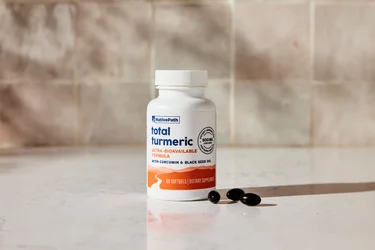There are some people who should avoid taking medicinal levels of turmeric. Don’t take turmeric if you are also taking a blood thinner like aspirin, warfarin, or clopidogrel. This is because turmeric itself is a natural blood thinner and taking them together can cause unsafe levels of bleeding (28).
You should also avoid turmeric if you take antacids, as turmeric can stop them from being effective (29).
If you take insulin, diabetes medications, or anti-hypertensive medications, talk to your doctor before trying turmeric, as turmeric could increase the power of the medications. While this may be beneficial in some cases, it could also make your medication too effective and put your health at risk, so it’s important to proceed carefully.
If you’re pregnant, don’t take turmeric supplements or medicinal-level doses of the spice. Small amounts in food are usually safe for pregnant women.






